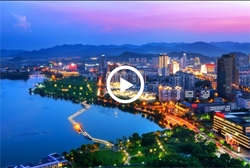Shaoxing's green transformation fuels high-quality development

Shaoxing promotes ecological priorities and green development. [Photo provided by Shaoxing Ecological Environment Bureau]
Over the past two decades, Shaoxing in East China's Zhejiang province has embraced the concept of "lucid waters and lush mountains are invaluable assets", achieving high-quality growth through ecological preservation.
The city has developed a strong environmental governance system, implementing 11 local regulations and over 30 specialized plans on air, water, and soil protection.
It pioneered a pollution rights trading system and digital platforms like the "Zero-Waste City" to enhance waste management. As one of China's first pilot "Zero-Waste Cities," Shaoxing has established a network of eco-education bases that blend environmental learning with tourism.
Shaoxing has also transformed its industrial structure, shifting from reliance on traditional industries like dyeing to emerging sectors such as semiconductors and biomedicine. The city now hosts 26 national-level green factories and one green industrial park.
Ecological restoration has paved new paths for tourism and rural development. By combining tea production with ethnic cultural tourism, Waipokeng village received over 320,000 tourists in 2024, illustrating how biodiversity protection and cultural heritage can work together to deliver shared prosperity.
By integrating ecological protection with economic growth, Shaoxing demonstrates how green mountains and clear waters can become invaluable assets for sustainable development.


 Zhejiang Resilient in Global Markets
Zhejiang Resilient in Global Markets Connecting Global Perspectives, Focusing on Zhejiang's Practices
Connecting Global Perspectives, Focusing on Zhejiang's Practices Shaoxing Showdowns
Shaoxing Showdowns